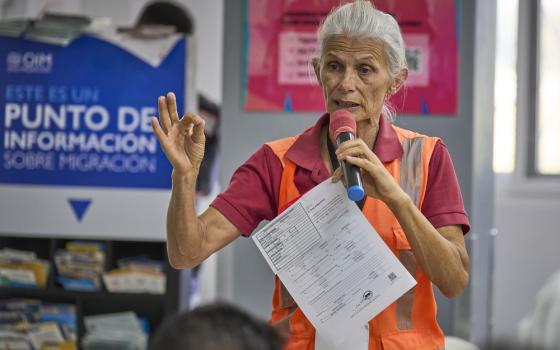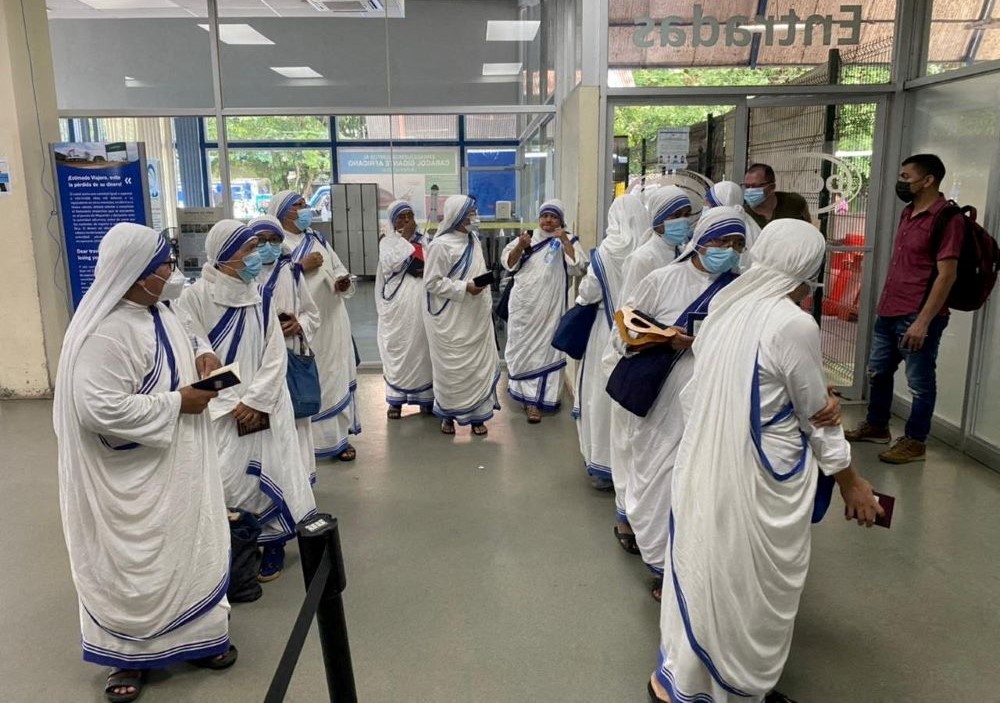
Members of the Missionaries of Charity wait at an immigration office in Penas Blancas, Costa Rica, July 6, 2022, after Nicaragua's government shut down their organization along with other charities and civil organizations. The government on Aug. 19 stripped the legal status of 22 women's religious communities, (OSV News/Sunil Kumar, handout via Reuters)
All but four of the 26 Catholic congregations recently stripped of their legal status in Nicaragua were women religious, but a Nicaraguan sister told Global Sisters Report Aug. 27 that even the latest large-scale government crackdown won't shake their resolve to help people and provide them hope. She also urged Catholics outside Nicaragua to tell others about their plight.
"Those of us here, because of the situation, we can't say anything. We can't publish anything. We absolutely cannot share any information the way a normal person would in a normal country," she told GSR. "But that's something [the rest of the church] can do."
GSR is withholding the sister's name for her safety and that of her congregation.
The government's actions have the potential to negatively affect the health of Nicaraguans, their access to food and other services for the elderly and poor, which many women religious provided via their ministries, not to mention their contributions to Catholic schools that now have been taken over by the government, she said. But women religious will remain with the Nicaraguan people no matter what happens, and won't allow anyone to take away the faith and hope that remains, she said.
"What's most important right now is to create networks of solidarity among us and be close to one another and help with whatever the other congregations may need," she said. "And another sentiment that has arisen is to want to remain firm in hope and to live, as we all say, day by day, no matter what happens, until when we can no longer do so."
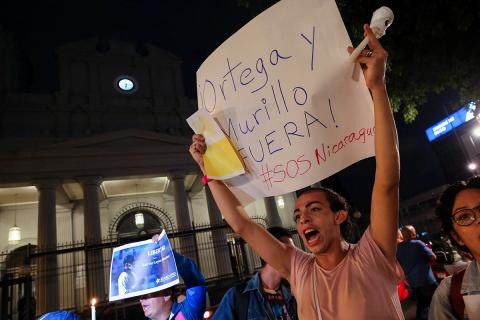
A Nicaraguan exiled in Costa Rica holds a sign that says. "Out with Ortega and Murillo! #SOSNicaragua," during the Faith and Freedom Vigil in front of the Metropolitan Cathedral of San José, Costa Rica, Aug. 19, 2022, to protest against the detention of Matagalpa Bishop Rolando Álvarez by Nicaraguan authorities. (OSV News/Reuters/Mayela López)
The women's congregations were among 1,500 nonprofits stripped of their legal status in a single day. Among them: Company of Mary, Discalced Carmelites, Oblates of the Sacred Heart of Jesus, Trappist sisters, Augustinians, Sisters of Charity of the Good Shepherd, as well as a congregation of Franciscans.
The Aug. 19 closures are part of the ongoing attacks on Nicaragua's religious and civic life from the increasingly totalitarian regime of President Daniel Ortega and his wife, Vice President Rosario Murillo.
When legal status is taken away, the government freezes the organizations' bank accounts and seizes their properties, the U.S. State Department said in a 2024 report, which also points out that 3,600 other nonprofits in Nicaragua have undergone a similar fate since 2018. Nicaraguan officials said Aug. 19 in the government publication La Gaceta that the nonprofits had "not met their obligations" and accused them of not reporting financial information. Among them were Baptist, Pentecostal and Evangelical groups, but also organizations promoting arts, sports, and culture and Indigenous identity.
Advertisement
A few Catholic congregations on the list already had left the country because of the difficulties of serving in Nicaragua, the sister said. Though many are reeling, sisters are focused on helping Catholics who have lived through the incarceration of priests, the expulsion of bishops, along with sisters, and the erosion of religious life, she said.
Though there's been more media attention on men's congregations, such as the Society of Jesus, known as the Jesuits, whose University of Central America in Managua was confiscated in August 2023 and the order's private property seized, communities of women religious in the country have been hit especially hard.
In June 2022, more than a dozen Missionaries of Charity, the order founded by St. Teresa of Kolkata, were expelled, their ministries with the poor disbanded and their property seized. In February 2023, a group of Trappist sisters announced they were leaving, and in July 2023, a group of Brazilian missionaries was expelled. Of the 26 congregations the Nicaraguan government recently targeted, four were men's communities, while the rest were women's communities.
Such repression has been the rhythm of life for congregations inside Nicaragua in recent years, and the sister who spoke to GSR said it's hard to say how many have left voluntarily or been forced to leave since many have done so in silence. For the moment, it's hard to know what the stripping of the legal status will mean, she said, but officials have appropriated the congregations' financial assets and properties. Though there do not seem to be any expulsions yet, it remains to be seen whether legal permission to stay in the country will be granted for those without Nicaraguan citizenship who are members of those congregations, she added.
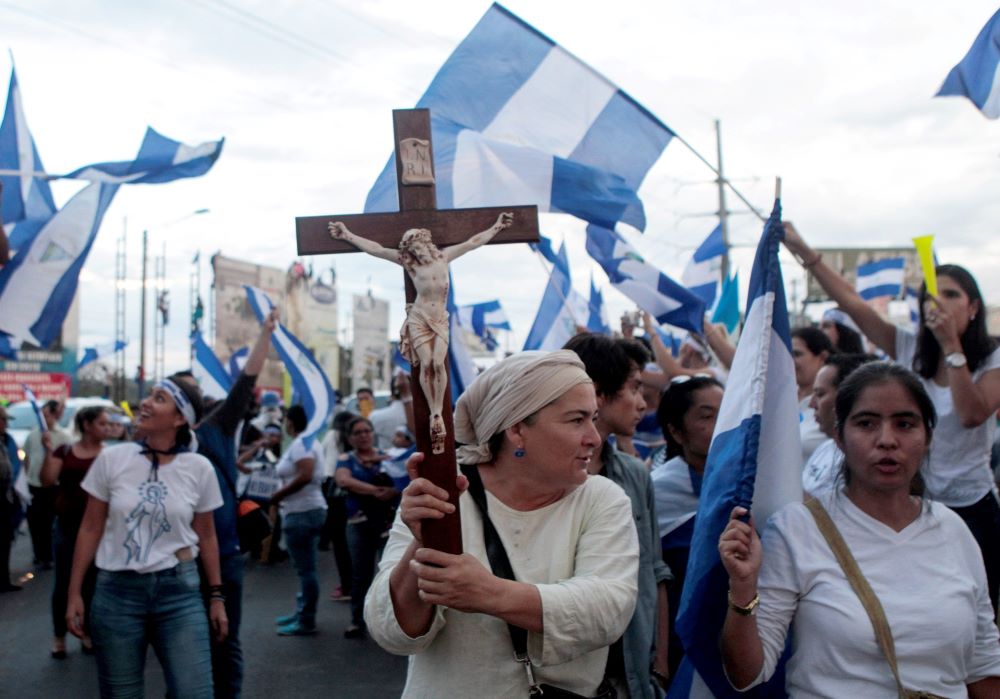
A demonstrator holds a crucifix during a protest against Nicaraguan President Daniel Ortega's government in Managua May 15, 2018. Since that year, the U.S. State Department says, at least 3,600 nonprofits in Nicaragua, including religious congregations, have had their legal status stripped in the country. (OSV News/Reuters/Oswaldo Rivas)
Stripping the legal standing of the order's Catholic schools and religious congregations is "quite significant because they are organizations of the Catholic Church that have a certain meaning in the country," she said.
"The schools, at this moment, are facing great uncertainty," she added.
Even as some Catholic schools' bank accounts have been taken over by the government, the Ministry of Education has told the staff to continue working "as if nothing has happened." But since the congregations are not in charge anymore and don't legally exist in the eyes of the Nicaraguan government, it's hard to know who is responsible for keeping the organizations running, whether workers will get paid, etc., the sister said.
"This is very serious and what worries us is the unknown," she said.
Though there's no known record documenting the number or which congregations have left the country, voluntarily or otherwise, a Nicaraguan sister (who spoke with GSR in April in Honduras on condition of anonymity) said each day, fewer sisters remain even though many congregations want to stay. But the government "drowns you financially," or finds another way to push sisters out, particularly those who are foreign born, she said.
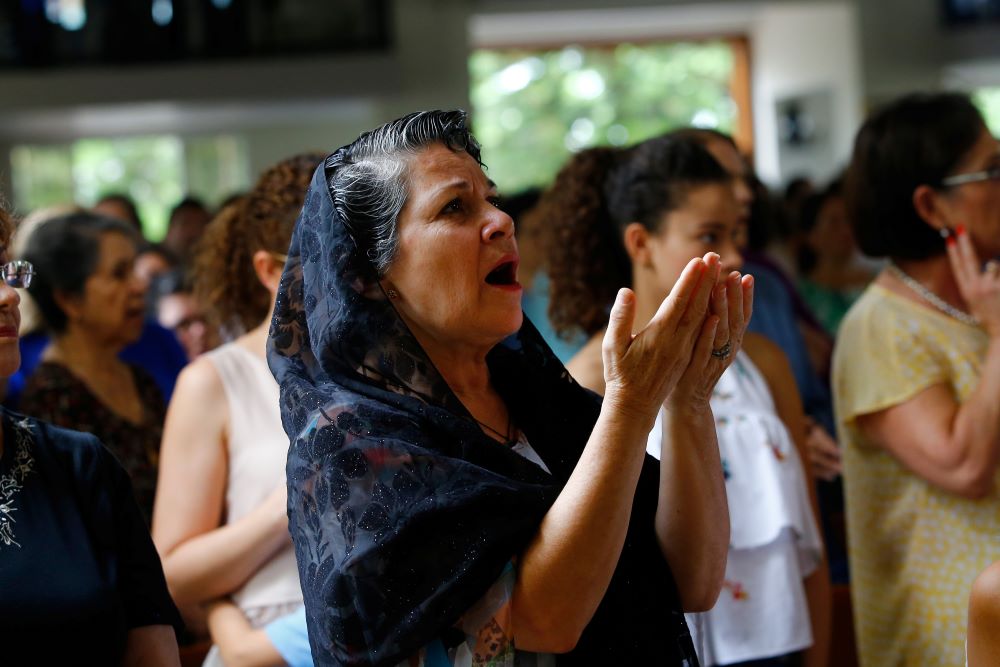
A woman is pictured in a file photo praying during Mass at Divine Mercy Catholic Church in Managua, Nicaragua. A recent government crackdown stripped 22 women's religious communities of their legal status in the country. (OSV News/Reuters/Oswaldo Rivas)
Those who leave don't want to talk openly about life inside the country, fearing that those still there will be punished in some form, she said.
"I believe that women in religious life are the ones who run the most risk in Nicaragua," she said. "They are the ones who most accompany communities of faith, accompany other women, and they are at the heads of schools."
As the days go by, many of the sisters who are staying in the country are those who were born in Nicaragua because they are harder for the government to get rid of, she said. They also run the risk, including inside Catholic circles, of being reported to officials if someone finds out they are critical of the government.
She, too, said she hangs on to prayer and the hope that life in Nicaragua will change, "I don't know when."
But it might be a while, she said.





